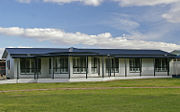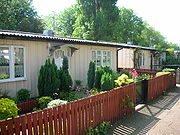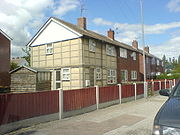
Prefabricated home
Encyclopedia




Some current prefab home designs include architectural details inspired by postmodernism
Postmodernism
Postmodernism is a philosophical movement evolved in reaction to modernism, the tendency in contemporary culture to accept only objective truth and to be inherently suspicious towards a global cultural narrative or meta-narrative. Postmodernist thought is an intentional departure from the...
or futurist architecture
Futurist architecture
Futurist architecture is an early-20th century form of architecture characterized by anti-historicism and long horizontal lines suggesting speed, motion and urgency. Technology and even violence were among the themes of the Futurists. The movement was founded by the poet Filippo Tommaso...
.
History
In the United States, several companies began offering mail order kit homes between 1902 and 1910, among them Sears Catalog Homes. In the UK, more than 156,000 prefabricated homes were built between 1945 and 1948.After World War II until 1948, Sell-Fertighaus GmbH built over 5000 prefabricated houses in Germany for members of the occupying force of the United States of America.
Current market state
Prefab homes are becoming popular in EuropeEurope
Europe is, by convention, one of the world's seven continents. Comprising the westernmost peninsula of Eurasia, Europe is generally 'divided' from Asia to its east by the watershed divides of the Ural and Caucasus Mountains, the Ural River, the Caspian and Black Seas, and the waterways connecting...
, Canada
Canada
Canada is a North American country consisting of ten provinces and three territories. Located in the northern part of the continent, it extends from the Atlantic Ocean in the east to the Pacific Ocean in the west, and northward into the Arctic Ocean...
and United States
United States
The United States of America is a federal constitutional republic comprising fifty states and a federal district...
as they are relativity cheap when compared to many existing homes on the market. The 2007 finance crisis has however deflated the cost of housing in North America and Europe, so not all prefab homes should be assumed to be cheaper than existing housing.
Modern architects are experimenting with prefabrication
Prefabrication
Prefabrication is the practice of assembling components of a structure in a factory or other manufacturing site, and transporting complete assemblies or sub-assemblies to the construction site where the structure is to be located...
as a means to deliver well-designed and mass-produced modern homes. Modern architecture forgoes referential decoration and instead features clean lines and open floor plan
Floor plan
In architecture and building engineering, a floor plan, or floorplan, is a diagram, usually to scale, showing a view from above of the relationships between rooms, spaces and other physical features at one level of a structure....
s.
Because of the design simplifications modern architecture provides (coupled with the cost savings that tend go with design simplification) many in the manufactured housing sector generally feel that modern architecture
Modern architecture
Modern architecture is generally characterized by simplification of form and creation of ornament from the structure and theme of the building. It is a term applied to an overarching movement, with its exact definition and scope varying widely...
designs are better suited for prefab home construction.
Word origin
The word "Prefab" is not an industry term like modular homeModular home
Modular buildings and modular homes are sectional prefabricated buildings or houses that consist of multiple modules or sections which are built in a remote facility and then delivered to their intended site of use...
, manufactured home, panelized home, or site-built home. The term is an amalgamation of panellized and modular building systems, and can mean either one. In today's usage the term "Prefab" is more closely related to the style of home, usually modernist, rather than to a particular method of home construction.
Zoning issues
Manufactured homes are not permitted in some communities and therefore, one should check from their local city to find about prefab building and construction laws regarding prefab homes before considering purchase.Europe
There is no pan-EU housing standard for this kind of home construction, as regulation has historically been at the national government level.There are however many EU directives that do apply to housing construction and design, but these directives do not directly affect the inter-EU modular home sector due to inter-EU free trade considerations.
However, each modular home is legally expected or obliged to be integrated into the local building code once the final construction is finished.
United Kingdom
In the United KingdomUnited Kingdom
The United Kingdom of Great Britain and Northern IrelandIn the United Kingdom and Dependencies, other languages have been officially recognised as legitimate autochthonous languages under the European Charter for Regional or Minority Languages...
the word "prefab
British post-war temporary prefab houses
British post-war temporary prefab houses were the major part of the delivery plan envisaged by war-time Prime Minister Winston Churchill in March 1944, and legally outlined in the Housing Act 1944, to address the United Kingdom's post–World War II housing shortage.Taking the details of the public...
" is often associated with a specific type of prefabricated house built in large numbers after the Second World War, such as Airey house
Airey house
An Airey house is a type of prefabricated house built in Great Britain following World War II.Designed by Sir Edwin Airey to the Ministry of Works Emergency Factory Made housing programme, it features a frame of prefabricated concrete columns reinforced with tubing recycled from the frames of...
s, as a temporary replacement for housing that had been destroyed by bombs, particularly in London
London
London is the capital city of :England and the :United Kingdom, the largest metropolitan area in the United Kingdom, and the largest urban zone in the European Union by most measures. Located on the River Thames, London has been a major settlement for two millennia, its history going back to its...
.
Despite the intention that these dwellings would be a strictly temporary measure, many remained inhabited for years and even decades after the end of the war. A small number are still in use in the 21st Century, however, more and more are being demolished. In 2011 the BBC reported that Britain's largest existing pre-fab estate, in Lewisham, South-East London, is to be demolished.
North America
The prefab home or house requires much less labour as compared to conventional houses or homes. Most of the companies are selling complete pre-manufactured prefab modular homes or houses called "mobile homes" or "manufactured homes".Local building codes in North America typically do not apply to prefab homes or houses; instead, these houses are built according to specialized guidelines (Federal HUD regulations, or their Canadian equivalents) for manufactured housing.
Australia/Asia
There are a small number of prefab home builders in Australia/Asia. In the overall housing sector, prefab housing construction is very small as the overall rate of housing construction has been very low due to slow population growth.The prefab sector in Australia/Asia is more optimised for exporting its product, as domestic consumption is limited.
See also
- All Parks Alliance for ChangeAll Parks Alliance for ChangeAll Parks Alliance for Change is a grassroots, non-partisan, nonprofit statewide organization that serves as a vehicle for Minnesota's 180,000 manufactured home park residents to express their needs and concerns in their parks and in the larger community.- Mission :APAC is the statewide...
- Airey houseAirey houseAn Airey house is a type of prefabricated house built in Great Britain following World War II.Designed by Sir Edwin Airey to the Ministry of Works Emergency Factory Made housing programme, it features a frame of prefabricated concrete columns reinforced with tubing recycled from the frames of...
- Boot houseBoot houseBoot houses were houses built in the United Kingdom after World War I to accommodate the housing boom following the war. They were named after Henry Boot, whose construction company produced an estimated 50,000 houses between the end of World War I and the start of World War II. Due to a shortage...
(World War I) and Wimpey no-fines houseWimpey no-fines houseThe Wimpey No-fines House is a house design by the George Wimpey company and intended for mass-production of social housing for families. Designed under the Ministry of Works post-World War II Emergency Factory Made programme, they are now one of the most common building designs in Britain...
(World War II) - other solutions to post-war housing crises - British post-war temporary prefab housesBritish post-war temporary prefab housesBritish post-war temporary prefab houses were the major part of the delivery plan envisaged by war-time Prime Minister Winston Churchill in March 1944, and legally outlined in the Housing Act 1944, to address the United Kingdom's post–World War II housing shortage.Taking the details of the public...
- CemestoCemestoCemesto is a sturdy, light-weight, waterproof and fire-resistant composite building material made from a core of sugar cane fiber insulating board surfaced on both sides with asbestos and cement. Its name is a portmanteau word combining "cem" from "cement" and "esto" from "asbestos."Cemesto was...
- Dymaxion houseDymaxion houseThe Dymaxion House was developed by inventor and architect Buckminster Fuller to address several perceived shortcomings with existing homebuilding techniques. Fuller designed several versions of the house at different times, but they were all factory manufactured kits, assembled on site, intended...
- E. F. Hodgson CoE. F. Hodgson CoThe E. F. Hodgson Company of Dover, Massachusetts, was one of a number of companies who used specialty mail-order catalogs, to advertise and sell sectional and ready-cut houses. From a small New England town, the Hodgson Company competed with economic giants such as Sears Roebuck and Montgomery...
- FuturoFuturothumb|right|A Futuro house in [[Warrington, New Zealand]]Futuro or Futuro House, is a round, prefabricated house designed by Matti Suuronen, of which about 100 were built during the late 1960s and early 1970s. The distinctive flying saucer like shape and airplane hatch entrance has made the houses...
- HUD USERHUD USERIn 1978, the U.S. Department of Housing and Urban Development's Office of Policy Development and Research established HUD USER, an information source for housing and community development researchers, academics, policymakers, and the American public.-Background on HUD USER:HUD USER is the primary...
- Huf HausHuf HausHuf Haus is a German company based in Hartenfels in the Westerwald region that manufactures prefabricated houses. Huf Haus is the world's leading company in selling houses in the Bauhaus tradition based on german Fachwerk. The construction allows individual floor plans, including for office buildings...
- Kit houseKit houseKit houses, also known as pre-cut houses, ready-cut houses, mail order homes, or catalog homes, were a type of prefabricated housing that was popular in the United States in the first half of the 20th century...
- Lustron houseLustron houseLustron houses are prefabricated enameled steel houses developed in the post-World War II era United States in response to the shortage of houses for returning GIs...
- Manufactured housingManufactured housingManufactured housing is a type of prefabricated housing that is largely assembled in factories and then transported to sites of use...
- Modular homeModular buildingModular buildings and modular homes are sectional prefabricated buildings or houses that consist of multiple modules or sections which are built in a remote facility and then delivered to their intended site of use...
- Prefabricated building
- Regulatory Barriers ClearinghouseRegulatory Barriers ClearinghouseThe Regulatory Barriers Clearinghouse collects, processes, assembles, and disseminates information on existing barriers that inhibit the production and conservation of affordable housing. RBC is part of the U.S...
- NTA IncNTA IncNTA Inc is a nationally recognized testing laboratory and third party certification agency headquartered in Nappanee, Indiana, USA.- About NTA :NTA evaluates and certifies products for the residential and commercial building industry....
- German inventors and discoverersGerman inventors and discoverersThis is a list of German inventors and discoverers. The following list comprises people from Germany or German-speaking Europe, also of people of predominantly German heritage, in alphabetical order of the surname. The main section includes existing articles, indicated by blue links, and possibly...
- The Venus ProjectThe Venus ProjectThe Venus Project is an organization that advocates the futurist visions of the American Jacque Fresco, with the aim of improving society with a global sustainable social design that it calls a "resource-based economy"...
External links
- National Association of Home Builders (US) - "NAHB's Building Systems Council's Concrete, Log, Modular, and Panelized Homes
- "Out & about: architecture: Prefab sproutings" by Jonathan Glancey in Guardian Unlimited, Wednesday August 31, 2005, accessed 12 October 2007
- From Africa to Queens Waterfront, a Modernist Gem for Sale to the Highest Bidder by William Hamilton in the NY Times on 1950s French modernist prefab built for Africa

